FP394 – The Weeping Woman: a Blackhall Tale, Part 1 of 3
Welcome to Flash Pulp, episode three hundred and ninety-four.
Tonight we present The Weeping Woman: a Blackhall Tale, Part 1 of 3
(Part 1 – Part 2 – Part 3)
[audio:http://traffic.libsyn.com/skinner/FlashPulp394.mp3]Download MP3
This week’s episodes are brought to you by The P.G. Holyfield Appreciation Dept.
Flash Pulp is an experiment in broadcasting fresh pulp stories in the modern age – three to ten minutes of fiction brought to you Monday, Wednesday and Friday evenings.
Tonight, Thomas Blackhall, master frontiersman and student of the occult, chases dark portents into a small town on the river’s edge.
The Weeping Woman: a Blackhall Tale, Part 1 of 3
Written by J.R.D. Skinner
Art and Narration by Opopanax
and Audio produced by Jessica May
On a morning so fierce and dry it made even the greenest timber seem at threat of flaring up from simple exposure, Thomas Blackhall stumbled into the village of Malhousen.
He had been summoned over the mystic aspect of an apparent impending demise.
Malhousen proper was little more than a trading post facing down a small churchyard, but the two dozen families that populated the surrounding rocky lands were on friendly enough terms to call each other neighbour, and the occasional mail delivery seemed to indicate that the government agreed on the designation.
Still, visitors were a rare thing that far off in the bushlands, and there was no public house, nor inn, motel or tavern – as a field-tromping farmer had passed word to Thomas that any with interest enough to make the journey likely did so because they knew someone in the area well enough to board with them.
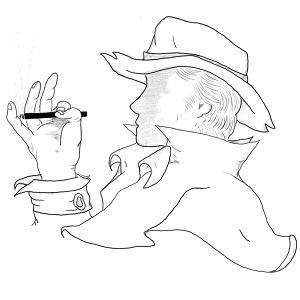 “If you need a place to stay, though,” the muck-handed man with the broad straw hat had said, “I’m sure a few coins could clean mother’s sewing parlour for the evening.”
“If you need a place to stay, though,” the muck-handed man with the broad straw hat had said, “I’m sure a few coins could clean mother’s sewing parlour for the evening.”
The offer had stood as long as it took Blackhall to explain what had brought him.
Strolling beyond the low white fence that separated the churchyard cemetery from non-hallowed turf, Thomas came to the river that had given the town its name, then cast off his gear with the tender concern of a man who’d just spent a full two weeks cursing at its weight.
Retrieving a small pouch from his breast pocket, he lay his great coat across his packs and sat upon the sandy bank to take in the current’s breeze. In time his fingers found a fine Spanish paper and stuffed it with tobacco, then, in more, the sun nuzzled the horizon.
Not being the Sabbath, there seemed to be only the church’s red-faced Scottish priest to glower at the stranger loafing away the afternoon.
At first, as his smoke had chased the water bugs downstream, Blackhall had thought that the cleric was simply the type to disapprove of all outsiders, but, by the hour at which his stomach began to call for supper, Thomas had decided the Scot likely knew why he was at hand, and that the holy man wanted nothing to do with his occult concerns.
It was his thinking that a true busy body could not be content to maintain a distance, but the priest had spent his day at just the distance necessary to be always aware of Blackhall’s position.
As Thomas began to consider what he was carrying that might appease his complaining appetite, a man exited from the trading post, walked the short breadth of its porch, then joined him on the riverbank via the fence-side route.
“I apologize,” said the prematurely-graying newcomer. “I’m Wyatt, the man who requested your presence. I would’ve joined you earlier, yet – well, you may’ve noted that business is sluggish, but what customers I receive depend on the regularity of my habits.
“I should also mention that my ears aren’t of much use. Though I could hear till my eighteenth year, they’re long gone now. It makes me poor conversation, as I talk too much about nothing and with little response. I’ve some skill at reading lips, but there are few here who will allow me to practice. They have fields to till and cows to slaughter, I suppose.”
“You’re sole occupation is running the store?” asked Blackhall, his words slow and clear.
The man raised his brow.
“The store?” repeated Thomas, his fingers waving in the squat shack’s direction.
“Oh, I act as middleman between those who grow beats and those who grow potatoes. The potato men come to me for their beats, the beat men come to me for their potatoes, and I make barely enough between them to taste either.
“In addition, the same boatman who collects the post brings up a selection of needles and dry goods that I resell. Despite my deafness I hear complaints over even that tiny profit.”
Blackhall nodded, and the shop keep smiled to have a friendly ear.
“The truth,” he continued, “is that I receive a child’s treatment because of my conversational difficulties. You’ve been a kind audience, but those who care for anything beyond inquiring about carrot seed often grow loud, which is a body posture as much as a tone, and neuter their language to a level more appropriate for a mush-headed bairn.
“It is usually those same folks who can’t scratch their own names, and thus can’t simply write out their orders and questions for prompt service.”
“It must be a lonely life,” Blackhall repeated until the man caught his meaning.
“It’s the postal counter that most keeps me in place,” replied Wyatt. “I’ve made a tangle of friends across the globe with those simple scraps of paper, and I collect more news than a dozen broadsheet hawkers. It was those same that gave me your name to search out when the matter of the death bringer raised itself.
“Still, as you can perhaps tell, I do long for the simple pleasure of seeing a face react, instead of outwaiting the slow transmission and careful composition of a letter.”
The conversation continued forward in little ways until dusk, but, due to their minor discussion, they did not note the departure of the flame-haired priest on his sagging, silent, pony.
By the time the frogs had begun to sing and dew was forming on the grass, Wyatt and Thomas were no longer alone.
Several men with lanterns, slurring courage and raising enough noise to find each other despite the wobbling of their illumination, began to gather about the white picket fence.
Their filth-kneed pants marked the crowd as farmers, but Thomas could discern nothing more as they took to shouting commands and demanding answers, simultaneously and without deference for his neighbour’s bellowing.
The priest was close behind.
It was as the Father moved to the forefront and raised his arms for silence, however, that there came, from beyond the river, the keening sound of death – a high and jittering wail that was no more dampened by the babble of men and water than would be a bullet.
Then the evening’s trials truly began.
Flash Pulp is presented by http://skinner.fm, and is released under the Creative Commons Attribution-Noncommercial 3.0 Unported License.
Intro and outro work provided by Jay Langejans of The New Fiction Writers podcast.
Coffin’s theme is Quinn’s Song: A New Man, by Kevin MacLeod of http://incompetech.com/
Freesound.org credits:
Text and audio commentaries can be sent to comments@flashpulp.com – but be aware that it may appear in the FlashCast.
– and thanks to you, for reading. If you enjoyed the story, tell your friends.
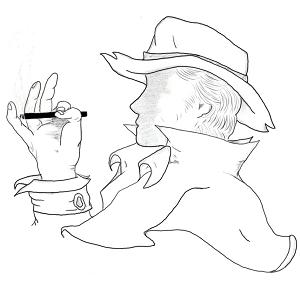 It was Elijah’s short assumption that this shifting was simply the process again renewed, but his illusion was shattered when the shadow of the youngest, a girl of five who had once had ginger hair, stretched and giggled.
It was Elijah’s short assumption that this shifting was simply the process again renewed, but his illusion was shattered when the shadow of the youngest, a girl of five who had once had ginger hair, stretched and giggled. An hour passed, then two, and yet, despite the night’s arrival, a pregnant moon rose through the spent clouds, offering a small boon to ease Thomas’ chilled frustrations.
An hour passed, then two, and yet, despite the night’s arrival, a pregnant moon rose through the spent clouds, offering a small boon to ease Thomas’ chilled frustrations.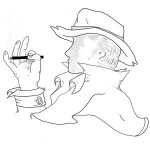 Mistaking the source of James’ agitation, she said, in her sweetest tone, “have no worries, any fellow with that much drink in his belly will likely spend the second half of the journey in unconsciousness.”
Mistaking the source of James’ agitation, she said, in her sweetest tone, “have no worries, any fellow with that much drink in his belly will likely spend the second half of the journey in unconsciousness.”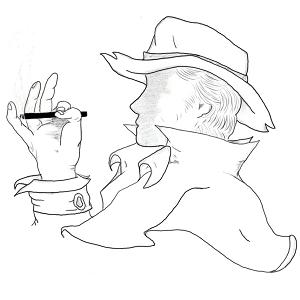 Before he could bring his occult ship fully under control, Thomas had moved well beyond the knot of Fitzhughs, and the crone, and his beloved Mairi.
Before he could bring his occult ship fully under control, Thomas had moved well beyond the knot of Fitzhughs, and the crone, and his beloved Mairi.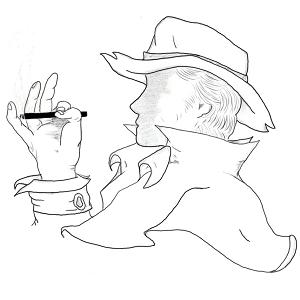 From his forgotten post in the barren oak, Thomas Blackhall watched the unnatural melee unfold.
From his forgotten post in the barren oak, Thomas Blackhall watched the unnatural melee unfold.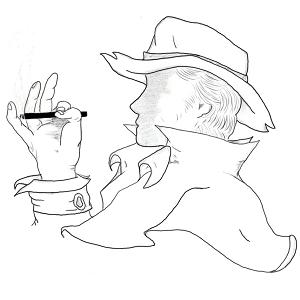 As Thomas made his way north, his lungs complained at each intake of frosted night air. Farmers’ axes had pushed hard at the forest, but, in this fresh land, the wilderness still stood ever on the horizon, and it was towards the shelter of those thick-limbed pines which Blackhall drove his legs.
As Thomas made his way north, his lungs complained at each intake of frosted night air. Farmers’ axes had pushed hard at the forest, but, in this fresh land, the wilderness still stood ever on the horizon, and it was towards the shelter of those thick-limbed pines which Blackhall drove his legs.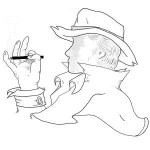 The trio stood staring at the corpse which lie, face down, on the floor of Thomas’ close-walled lodging.
The trio stood staring at the corpse which lie, face down, on the floor of Thomas’ close-walled lodging. As he tenderly prodded his fat lip, the young private seemed to find some relief in his admission.
As he tenderly prodded his fat lip, the young private seemed to find some relief in his admission. Thomas Blackhall, with his pants still muddied from travel, was leaning against the splinter-bristled door that acted as barrier between his rented room and the remainder of the Bucking Pony.
Thomas Blackhall, with his pants still muddied from travel, was leaning against the splinter-bristled door that acted as barrier between his rented room and the remainder of the Bucking Pony.